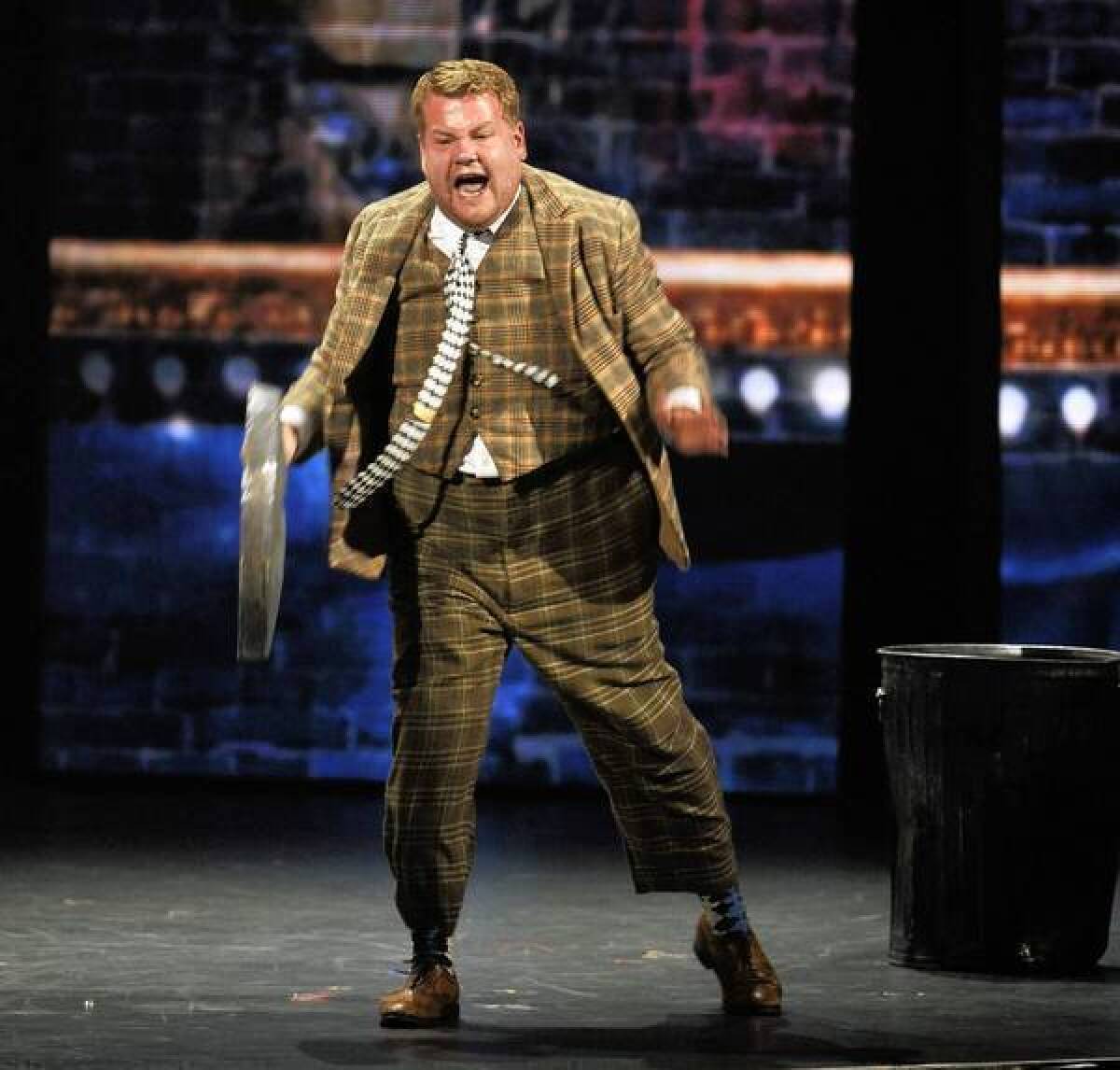Tony Awards: ‘Clybourne Park,’ ‘Once’ are big winners

Bruce Norris’ “Clybourne Park,” a sharp-toothed satirical drama about the vagaries of race and real estate, won for best play, and “Once,” a starry-eyed romance centered on an Irish street musician and a Czech immigrant flower seller, topped the best musical category at Sunday’s 66th Tony Awards.
The work of three legends of the American theater, playwright Arthur Miller and the song-writing brothers George and Ira Gershwin, reaped multiple honors. Miller’s blue-chip middle-American tragedy “Death of a Salesman” won for revival of a play.
For musical revival, Tony voters chose the slimmed version of the Gershwins’ 1935 opera”Porgy and Bess,” about the black denizens of a Charleston ghetto. The show, rechristened “The Gershwins’ Porgy and Bess,” triumphed over rival revivals “Jesus Christ Superstar,””Evita” and “Follies,” whose composer, Stephen Sondheim, had publicly chastised the creative team behind “Porgy and Bess” for allegedly tampering with a classic.
TONY AWARDS: Red carpet | Winners | Best & worst
In accepting the Tony, producer Jeffrey Richards pointedly thanked the Gershwin estate among others for “permission to bring ‘Porgy and Bess’ into the 21st century.”
Audra McDonald, previously a four-time winner for featured actress, finally won lead actress in a musical for her stirring performance as the Gershwins’ indomitable heroine.
“Once,” a pocket musical that took many on Broadway by surprise this season, won eight awards. John Tiffany, making his Broadway debut, won musical directing over more experienced rivals, including Great White Way veteran Kathleen Marshall. With his lyrical Irish accent ringing through his acceptance speech, Tiffany acknowledged his family “who gave me the gift of music.”
Other “Once” winners were Bob Crowley (scenic design), Natasha Katz (lighting design) and Clive Goodwin (sound design).
Early in the evening, there were hints of a coming smackdown between “Once,” adapted from a 2006 indie film, and “Newsies,” a feel-good show about a turn-of-the-century New York newsboys’ strike, adapted from a 1992 Disney film musical.
Before the telecast’s official start, “Once” won for orchestration (Martin Lowe), and Enda Walsh won for book of a musical. Meanwhile, Christopher Gattelli won choreography for “Newsies.”
“Newsies” also won for score. Composer Alan Menken, an eight-time Oscar winner, and lyricist Jack Feldman joked that theirs was the first musical to win both the Razzie and the Tony for the same show.
The leading actor categories yielded several of the evening’s most emotional acceptance speeches. McDonald teared up while recalling herself as a “hyper-active” “little girl with a pot belly” who’d found a home in the theater.
Steve Kazee, winner of lead actor in a musical for “Once,” thanked his fellow cast members for their support after the death of his mother, who passed away Easter Sunday.
Lead actor in a play winner James Corden’s sublime physical clowning in “One Man, Two Guvnors,” Richard Bean’s transposition of Carlo Goldini’s 1743 commedia dell’arte comedy to 1960s Brighton, England, earned him an upset victory over Philip Seymour Hoffman in “Death of a Salesman.”
In his speech, Corden chokingly thanked his girlfriend, the mother of his child.
“She’s my baby mama, and I can’t wait to marry her,” Corden said. “She made me say ‘us’ instead of ‘I’ and ‘we’ instead of ‘me.’”
Nina Arianda won lead actress in a play for her turn as an ambitious young actress in David Ives’ meta-fictional “Venus in Furs,” based on the classic erotic novel.
Hosted for the third time by Neil Patrick Harris, the show as usual alternated between kinetic musical numbers and more down-tempo dramatic sketches.
“Clybourne Park,” which won the Pulitzer Prize for drama in 2011, was heavily favored to win the Tony. Set in a Chicago neighborhood, split between 1959 and 2009, the drama is a kind of sequel to Lorraine Hansberry’s landmark play “A Raisin in the Sun,” which examines the impact first of integration, then, 50 years later, of gentrification on an inter-connected group of white and black characters.
“I have to thank Lorraine Hansberry, who actually built the neighborhood of Clybourne Park,” Norris said in his acceptance speech. “We just moved in and depressed the property values.”
Norris also gave a shout-out to several regional theaters, including the Mark Taper Forum in Los Angeles, where “Clybourne Park” was produced before its Broadway run.
In an interview before the awards, “Clybourne Park” producer Jordan Roth said, “L.A. audiences were a very important part of this journey. We couldn’t have done it without them.”
Mike Nichols, 80, an 18-time Tony nominee, earned his sixth Tony for helming the acclaimed revival of Miller’s play. After kissing his wife, Diane Sawyer, Nichols took the stage to thank the playwright’s daughter, Rebecca Miller, toast his cast as “straight from heaven,” and laud Miller’s work as a play that “gets truer as time goes by.”
“There’s not a person in this theater who does not know what it is to be a salesman,” Nichols said.
But “Salesman’s” stock slumped in another key category. Christian Borle, best known for NBC’s “Smash,” won for featured actor for playing a pirate in the Peter Pan origin myth “Peter and the Starcatcher.” Andrew Garfield, coming soon to a movie screen near you as the latestSpider-Man, had been the category’s heavy favorite for his portrayal of Willy Loman’s under-achieving son Biff in “Salesman.”
Judith Light won the featured actress award for her striking turn as one of the least sympathetic characters in Jon Robin Baitz’s play “Other Desert Cities,” about a Palm Springs clan grappling with a painful family secret. Linda Edmond had been slightly favored for “Death of a Salesman.”
Michael McGrath won featured actor in a musical for his portrayal of Cookie McGee, a bootlegger masquerading as a butler, in the reconstructed Gershwin Prohibition-era musical “Nice Work If You Can Get It.” His colleague Judy Kaye won featured actress for “Nice Work,” her first since winning for “The Phantom of the Opera” in 1988.
“I guess chandeliers have been very, very good to me,” Kaye joked.
A lifetime achievement award went to producer Emanuel Azenberg, while screen and stage star Hugh Jackman was honored for his philanthropic work on behalf of AIDS prevention. Jackman was presented the award by his wife who, he joked, “has never kept a secret her entire life.”
Like they say in show biz, good timing is everything.
TONY AWARDS: Red carpet | Winners | Best & worst
Times staff writer Steven Zeitchik in New York contributed to this story.
More to Read
The biggest entertainment stories
Get our big stories about Hollywood, film, television, music, arts, culture and more right in your inbox as soon as they publish.
You may occasionally receive promotional content from the Los Angeles Times.











